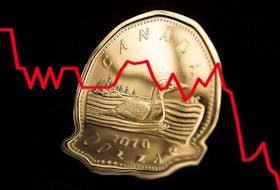The Bank of Canada might not be such an outlier after all.
Governor Stephen Poloz and his deputies left the benchmark interest rate unchanged on July 10. They also looked past a recent run of strong data and issued a mostly dour assessment of the economy’s near-term prospects.
Unlike central bankers in the United States and other places, Canada’s policy makers didn’t foreshadow lower borrowing costs later this year. But their tone suggests a cut is more likely than an increase. The Bank of Canada cut its forecast for economic growth next year to 1.9 per cent from 2.1 per cent, a decent-but-unspectacular pace that won’t generate much inflation pressure.
Impressive hiring, wage increases, and low interest rates are keeping domestic demand buoyant. But U.S. President Donald Trump’s trade wars are killing factory production and business investment around the world.
The Bank of Canada said in its latest quarterly outlook that trade uncertainty will reduce business investment by three per cent by 2021 from what it would have been otherwise, or by about $8 billion. The central bank predicts gross domestic product will expand only 1.3 per cent this year, well short of the 1.8-per-cent rate at which policy makers estimate that growth begins to cause price increases.
“Evidence has been accumulating that ongoing trade tensions are having a material effect on the global economic outlook,” the central bank said in a statement. “Trade conflicts between the United States and China, in particular, are curbing manufacturing activity and business investment and pushing down commodity prices.”
The news isn’t all bad. The Bank of Canada dropped housing from its shortlist of significant threats to the outlook. Vancouver and Alberta continue to provide cause for concern, but otherwise, real-estate prices suggest housing markets in the rest of the country are stable, the central bank said.
And second-quarter growth was stronger than expected. The central bank revised its forecast to an annual rate of 2.3 per cent from 1.3 per cent in April. However, the Bank of Canada doubts that burst of activity will last. It sees growth slowing to a pace of 1.5 per cent in the current quarter.
“Growth in the second quarter appears to be stronger than predicted due to some temporary factors, including the reversal of weather-related slowdowns in the first quarter and a surge in oil production,” the statement said. “Exports rebounded in the second quarter and will grow moderately as foreign demand continues to expand. However ongoing trade conflicts and competitiveness challenges are dampening the outlook for trade and investment.”
There had been a feeling that Canada’s stronger-than-expected data would keep the possibility of a interest-rate increase on the table. That’s not the case now, as the Bank of Canada appears to be deeply concerned about the country’s ability to endure the trade wars.
The numbers are good, but “the outlook is clouded by persistent trade tensions,” the statement said. “Taken together, the degree of accommodation being provided by the current policy interest rate remains appropriate.”
•Email: [email protected] | CarmichaelKevin
Copyright Postmedia Network Inc., 2019









